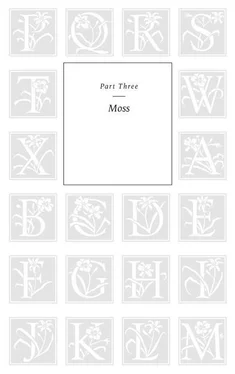Vanessa Diffenbaugh - The Language of Flowers
Здесь есть возможность читать онлайн «Vanessa Diffenbaugh - The Language of Flowers» весь текст электронной книги совершенно бесплатно (целиком полную версию без сокращений). В некоторых случаях можно слушать аудио, скачать через торрент в формате fb2 и присутствует краткое содержание. Жанр: Старинная литература, на английском языке. Описание произведения, (предисловие) а так же отзывы посетителей доступны на портале библиотеки ЛибКат.
- Название:The Language of Flowers
- Автор:
- Жанр:
- Год:неизвестен
- ISBN:нет данных
- Рейтинг книги:4 / 5. Голосов: 1
-
Избранное:Добавить в избранное
- Отзывы:
-
Ваша оценка:
- 80
- 1
- 2
- 3
- 4
- 5
The Language of Flowers: краткое содержание, описание и аннотация
Предлагаем к чтению аннотацию, описание, краткое содержание или предисловие (зависит от того, что написал сам автор книги «The Language of Flowers»). Если вы не нашли необходимую информацию о книге — напишите в комментариях, мы постараемся отыскать её.
The Language of Flowers — читать онлайн бесплатно полную книгу (весь текст) целиком
Ниже представлен текст книги, разбитый по страницам. Система сохранения места последней прочитанной страницы, позволяет с удобством читать онлайн бесплатно книгу «The Language of Flowers», без необходимости каждый раз заново искать на чём Вы остановились. Поставьте закладку, и сможете в любой момент перейти на страницу, на которой закончили чтение.
Интервал:
Закладка:
I slid down the wall and sat in the puddle at my feet. If I had owned a clean towel, I might have retrieved it. But there weren’t any, and there wouldn’t be any for a long time. I was no Marlena. I couldn’t carry the baby and a bag of laundry up the hill, pressing quarters into vibrating machines with a hungry mouth on my exposed breast. I wished I had thought about the laundry before the baby was born.
I wished I had thought of a lot of things, now that it was too late. I should have bought diapers, and groceries, and baby clothes. I should have gathered the take-out menus of every restaurant on the hill and memorized the number of a delivery service. I should have found a daycare, or a nanny, or both. I should have bought a stack of parenting books and read every one. I should have decided on a name.
I couldn’t do any of that now.
The baby and I would use dirty towels, sleep on dirty sheets, and wear dirty clothes. The idea of doing anything other than nursing and trying to nourish my own body was too overwhelming to consider.
We survived Monday, Tuesday, and Wednesday, alone except for a brief food drop from Renata. It was spring; business was picking up, and Renata had never replaced me. Marlena called to tell me she was taking the month to visit relatives in Southern California. She would be back, she said, in time for our April engagements. The phone did not ring again.
On Thursday the baby ate all day. She awoke for her first feeding just after six in the morning and nursed continuously, falling asleep mid-suck every half-hour. If I attempted to remove her from my breast, she startled awake with a deafening shriek. She would sleep only with her face pressed against my naked skin, and when I tried to set her down, no matter how deep in sleep she appeared, she would cry out for more milk.
I resigned myself to my own hunger, spending the morning listening to the sounds of spring enter the apartment through the open kitchen window. Birds, brakes, an airplane, a school bell. I stroked the baby’s soft shoulder as she slept, and told myself that physical hunger was a reasonable sacrifice to make for a baby as beautiful as she. But as the day progressed, the hunger traveled from my stomach to my brain. I began to hallucinate, not sights but smells: phantom meatballs, a sauce simmering, and something dark chocolate baking.
By mid-afternoon I had convinced myself of the existence of a multi-course meal in my kitchen. I climbed out of the blue room with the baby still attached to my breast. When I saw the stove turned off, the burners bare, and the oven empty, I almost cried. I placed the baby on the kitchen counter and patted her distractedly while searching for something to eat. At the back of the cupboard I found a can of soup. The baby whimpered and started to cry. The sound weakened the muscles in my hands until it was impossible for me to turn the dial of the can opener. Giving up halfway around the can, I pried the lid back with a spoon and drank the soup cold, without pausing for breath. When it was empty, I threw the aluminum can into the sink. The baby startled at the loud sound and stopped crying long enough for me to press her face back to my breast. I carried her back to the blue room, my hunger unappeased.
Friday began as Thursday had, except that I was twenty-four hours more exhausted and as hungry as the never-satisfied baby. I ate peanuts in bed while the baby nursed. Mother Ruby had warned me that the baby would go through growth spurts, and I comforted myself with this thought. The end must be growing near. I didn’t have much more to give her, I thought, slipping my finger under the flap of skin that had once been a round, full breast.
At noon I pulled the sleeping baby away from my chest and saw that her lips were red. My nipples were dry and had cracked under the constant suction. The baby was drinking my blood as well as my milk; no wonder I was exhausted. Soon there would be nothing left of me. I eased her gently onto the bed, praying that just this once, she would stay asleep. There was one tray of Marlena’s cooking left in the freezer.
But the baby awoke as I set her down, lifting her chin toward my sore nipple. I sighed. She couldn’t possibly still be hungry, but I picked her back up and let her attempt to extract more milk from my deflated chest.
The baby sucked only two or three times before falling back asleep, her mouth falling open, but awoke again when I tried to set her down. She made a gurgling, sucking sound and puckered her lips.
I put her back to my breast more forcefully than I had intended. “If you’re hungry, eat,” I said, growing frustrated. “Don’t fall asleep.” The baby grimaced and latched on.
I sighed, regretting my impatient touch.
“That’s good, big girl,” I said, trying out Mother Ruby’s words. They sounded forced and insincere on my tongue. I stroked the baby’s hair, a wispy black tuft growing over her ear.
When she’d fallen back to sleep, I stood up slowly and walked her to the Moses basket. Perhaps she would find comfort in the small, padded enclosure, I thought, lowering her a centimeter at a time. I had succeeded in putting her down but had not even withdrawn my arms when she started crying again.
Standing above her, I listened to her cry. I needed to eat. My grasp on reality was slipping with each additional empty-stomached hour, but I couldn’t stand the sound of her wail. Good mothers did not let their babies cry. Good mothers put the needs of their babies first, and I wanted, more than anything, to be a good mother. It would make up for all the harm I had caused, if I could do something right, just this once, for another person.
Picking her up, I walked the length of the room and back again. My nipples needed a rest. I hummed and jiggled and paced as I had seen Marlena do, but the baby wouldn’t be calmed. She twisted her face from side to side and began to suck in the cool oxygen, searching. I sat on the couch and pressed a soft, round pillow against her cheek. She was not fooled. She began to cry harder, sucking air and choking and stretching her short arms over her head. She could not possibly be hungry, I told myself again; she didn’t need to eat.
The baby’s face turned as red as the blood still leaking from my nipple. Walking over to the Moses basket, I set her inside.
In the kitchen, I banged my fists on the tile counter. I was hungry; the baby was not. I needed to take care of myself. I needed her to wait just an hour, while I filled my stomach and rested my nipples. From across the room, I could see her face, now near purple with desperation. She wanted me; she didn’t understand that my body was not her own.
I walked out of the room, away from the noise, and stood at Natalya’s window. I couldn’t bring her to my breast. Not after nursing for nearly thirty-six hours straight. She had consumed all my milk, I was sure, and had moved on to something deeper, more precious, something connected to my heart or nervous system. She wouldn’t be satisfied until she had devoured all of me, until she had sucked every fluid, thought, and emotion from me. I would be an empty shell, incoherent, and she would still be hungry.
No, I decided, she couldn’t have any more. Mother Ruby would not be back until the next day, and there was no sign of Renata. I would go to the store for formula and feed her with a bottle until my nipples healed. I would leave her in her basket and run the whole way to the market and back. Bringing her to the grocery store would be too risky. Someone would hear her hungry, brokenhearted wail and understand my incompetence. Someone would take her away from me.
Grabbing my wallet, I sprinted down the stairs before I could change my mind. I ran up a hill and down the other side, not stopping for cars or pedestrians. I passed everyone. My body, still healing from the birth, felt as if it was splitting in half. A fire burned from between my legs and spread up my spinal cord to the back of my neck, but still I ran. I would be back before the baby even knew I was gone, I told myself. I would feed her a bottle in my arms, and she would finally, after days of nursing, be full.
Читать дальшеИнтервал:
Закладка:
Похожие книги на «The Language of Flowers»
Представляем Вашему вниманию похожие книги на «The Language of Flowers» списком для выбора. Мы отобрали схожую по названию и смыслу литературу в надежде предоставить читателям больше вариантов отыскать новые, интересные, ещё непрочитанные произведения.
Обсуждение, отзывы о книге «The Language of Flowers» и просто собственные мнения читателей. Оставьте ваши комментарии, напишите, что Вы думаете о произведении, его смысле или главных героях. Укажите что конкретно понравилось, а что нет, и почему Вы так считаете.












